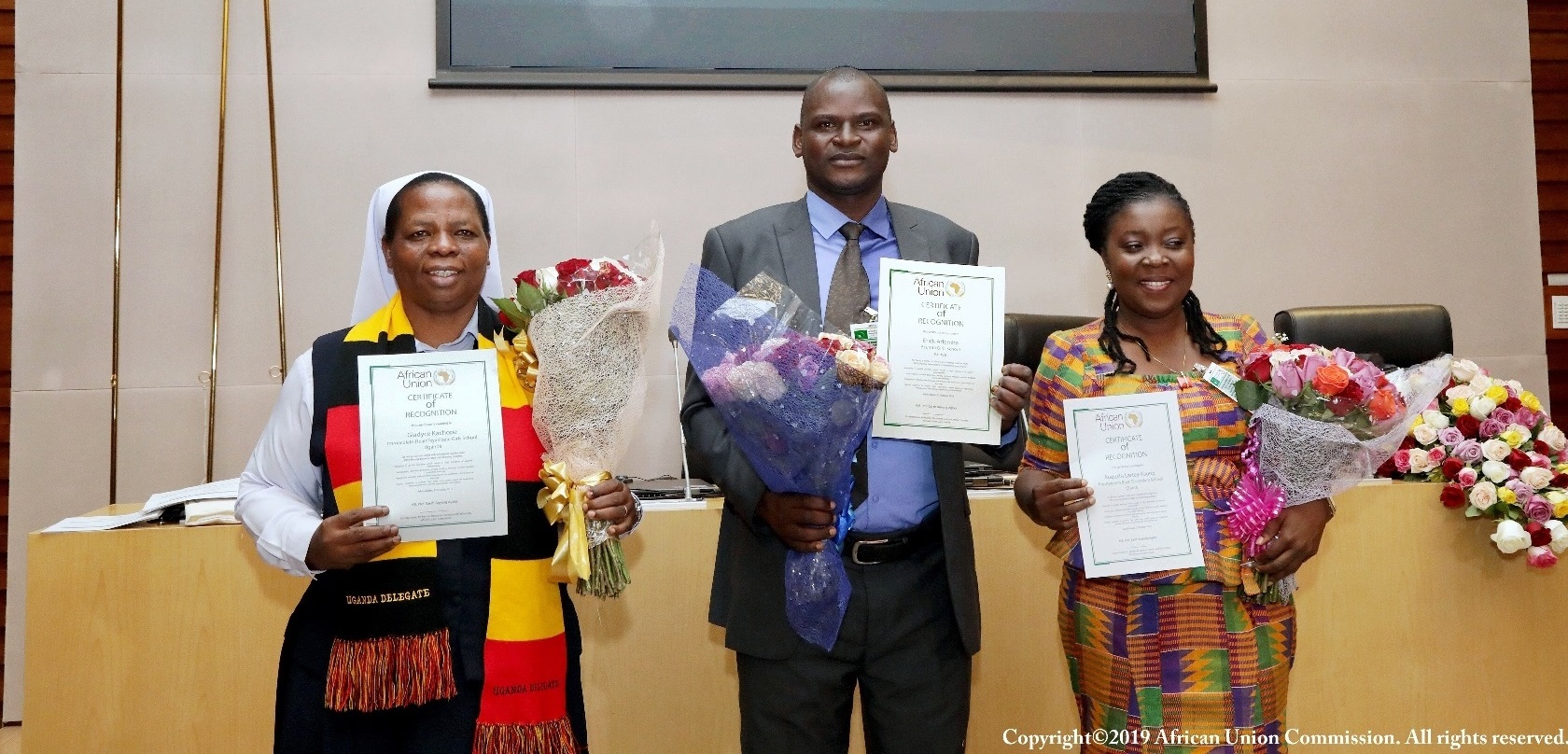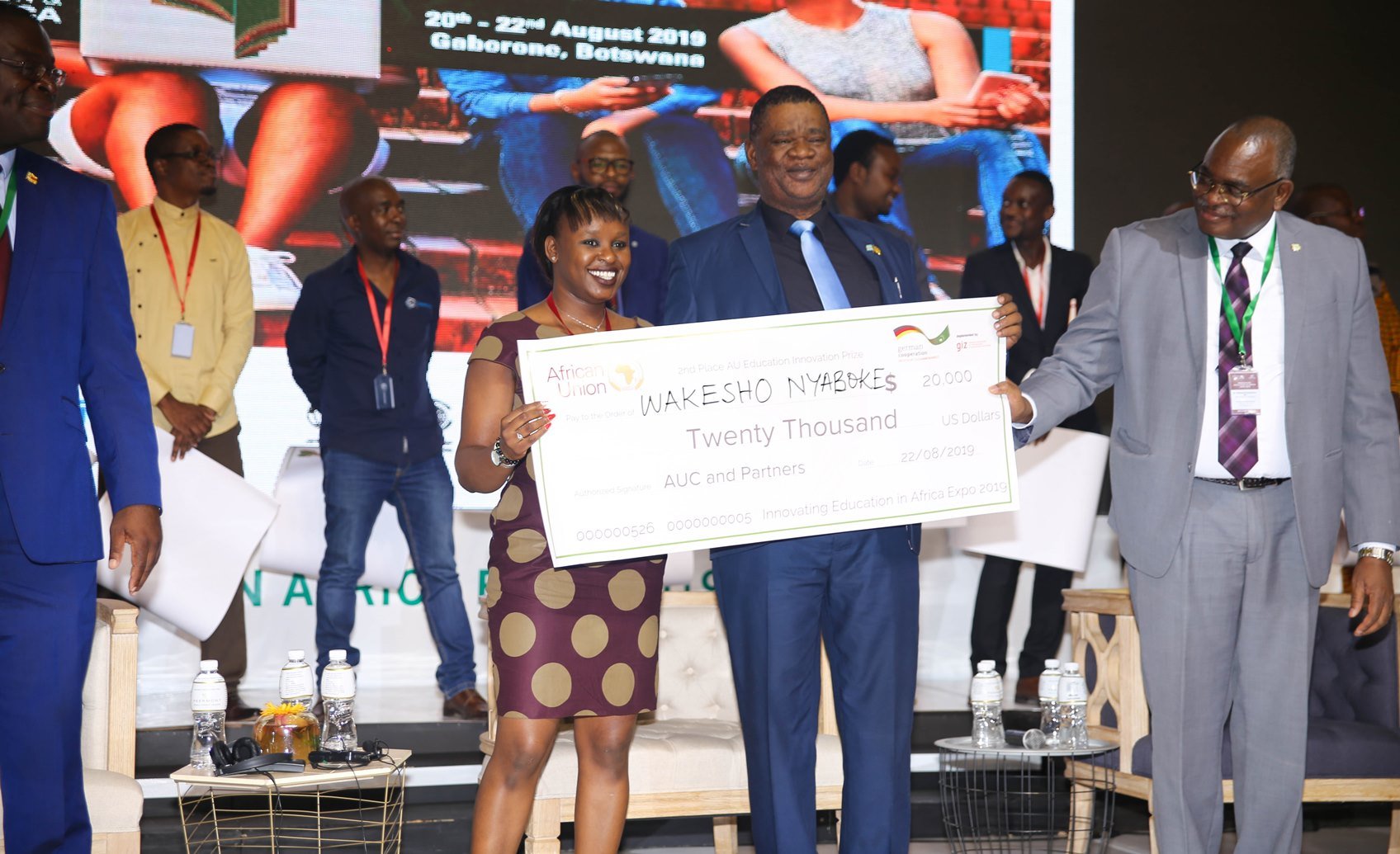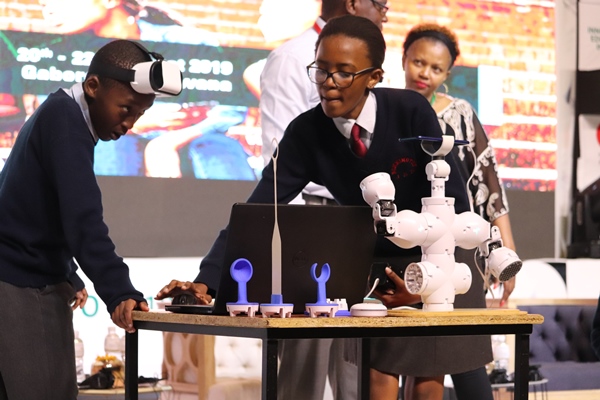.jpg)
Title of Innovation: Busitema University Lightboard for e-learning
Year of implementation: 2018
Implemented by: Busitema University
Country/Countries where the Innovation is being implemented: Uganda
Problem being solved
Science and Engineering lectures often times involve drawings and equations and the current trend has been that chalkboards and whiteboards are used, however, the challenge is that the instructor or the lecturer gets disconnected from the learners when he turns his back to write the equations or drawings (Birdwell and Peshkin, 2015)
Due to the busy nature of the masses and the need for upgrading, the need for online learning or flipped lessons is projected to increase. The lightboard enables the instructor to solve equations while facing the learners and leading to increased perception and learning.
Description of innovation
The Lightboard is a glass board, which has light internally from LED strips along its edges. In order to record video lecturers for online learners, a video camera captures the presenter and his/her writing by viewing through the glass. The result is vivid, luminous writing floating in front of the presenter, who can now face toward the camera while drawing and interacting with the material on the board.
With the increase of the Internet speeds in Africa, It is highly possible to produce online live lectures at ago using state of the art lectures with the video camera. Previously, it was demonstrated by Dr. Rwahwire when Engineering Mechanics tutorials were recorded and filmed on the light board as shown in the links below:
1. https://www.youtube.com/watch?v=x0-G4OLwBQk
2. https://www.facebook.com/kekensamedia/videos/940324609460975/
Outcomes and Impact
The mass rollout of the lightboard in Africa's higher education system will be a new paradigm to the higher education sector.
Africa is a continent that needs its workers to be skilled as well as on the job and yet it is evident the majority of workers in Africa have no time for lifelong learning. The lightboard will enable live video lectures through streaming and the learners can be able to study online either through social media or from a web-portal.
Potential to be scaled and replicated
The innovation can be upscaled through funding of setting up the model e-learning lightboard studio at Busitema University which will be a resource center for other universities and schools.
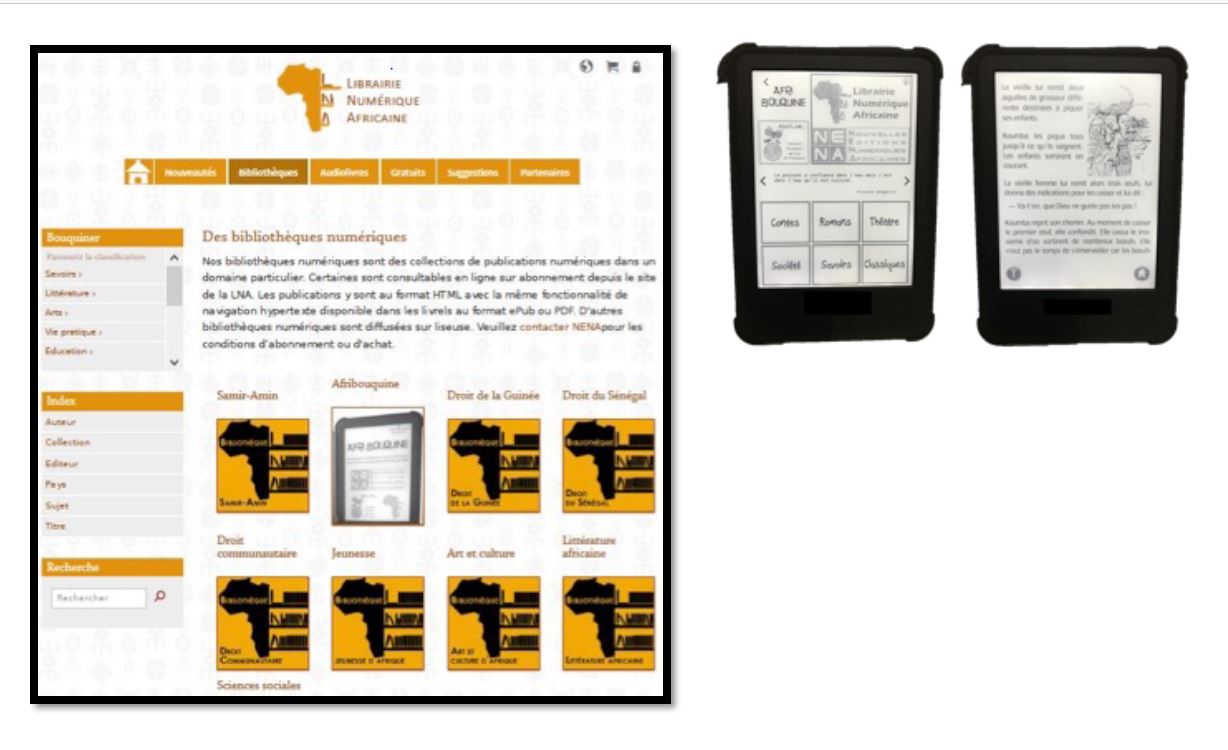
Title of Innovation: African Digital Libraries (Online and Offline) to Improve Access and Quality of Education
Year of implementation: 2017
Website: www.nena-sen.com
Implemented by: Nouvelles Editions Numeriques Africaines (NENA)
Country/Countries where the Innovation is being implemented: Senegal
Problem being solved
More than 65% of the African population is under 25 years old. This population will double to reach 2.5 billion in 2050. Their education remains one of the major challenges. It will be necessary to set up the material conditions for access to educational resources and documentation like libraries. The situation is very concerning because of the majority of schools in African countries do not have libraries or have insufficient documentation, especially regarding African content.
Description of innovation
Based on this observation, Nouvelles Editions Numériques Africaines (NENA) has produced a fully operational solution that can be scaled up across Africa. These are digital libraries of African content. Launched in 2017, the African Digital Libraries include two types:
1) Offline digital libraries on eReader
An eReader is a mobile device dedicated to reading digital books. NENA offers two eReaders, one for primary school level, the other for secondary level. It is now possible for schools to install a digital library, which is adapted to the curriculum, faster and at a lower cost than traditional libraries.
2) Online digital libraries
NENA has set up digital libraries available online on its platform. These are 9 digital libraries in law, social sciences, management, literature, art and culture, youth, accessible on the Internet by subscription.
More than 3,000 titles, in French and English, from more than 95 African publishers will be available before the end of 2019.
Outcomes and Impact
Already two schools in Dakar with a few thousand students have acquired dozens of eReaders.
In March 2018, a Senegalese NGO opened the "Bibliothèque populaire du développement" with a digital room with the acquisition of 10 NENA’s eReaders.
For online digital libraries, the Virtual University of Senegal is currently subscribing to all these libraries for its 4,000 students. The steps are underway at the 6 public Universities in Senegal for a subscription for 60,000 students.
Potential to be scaled and replicated
From its conception, NENA's project is multilingual and pan-African. So it can be replicated in any country. Among the 40 publishers with whom NENA has signed a co-publishing contract, many come from other African countries (Cameroon, Ivory Coast, Guinea etc). NENA thus helps these publishers to digitize their catalog.
The viability of the project is based on the fact that since 10 years NENA has been digitizing and safeguarding Africa's scientific and cultural heritage in order to make it accessible and to ensure its transmission to future generations. NENA's digital libraries are destined to become a sustainable common good of Africa
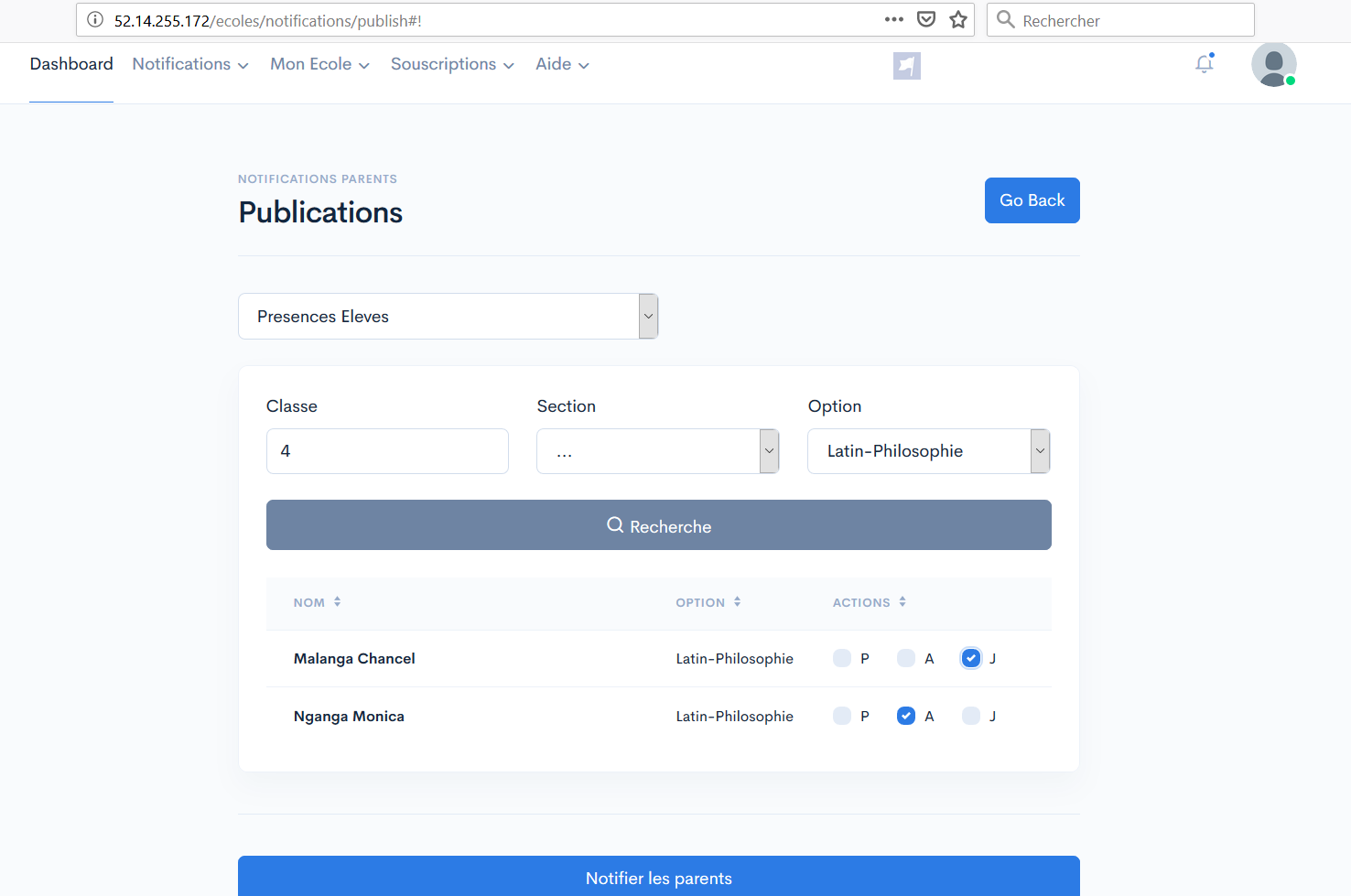
Title of Innovation: KELASI
Year of implementation: 2019
Website: https://eagle-sight.net/
Implemented by: EAGLE SIGHT Sarl
Country/Countries where the Innovation is being implemented: Democratic Republic of the Congo
Problem being solved
We have observed an ineffective communication between the actors of child-rearing. This has a negative impact on the child's performance at school, because the tutor has almost no physical time to devote to this follow-up.
Description of innovation
KELASI consists of setting up a web portal allowing schools to publish students' school activities as well as important news releases to tutors. Once this information is available on the platform, it will receive it immediately via an SMS notification or mobile app.
The KELASI platform consists of a web portal giving access to a database of data containing all of the student's school information, allowing it to be transmitted to the tutor.
To use the online app, schools must have an Internet connection and a web browser like Microsoft Internet Explorer. Parents must carry a simple mobile phone to receive SMS notifications and resubscribe through the USSD menu using electronic currency.
Information provided to the tutor includes school grades, absences and delays in classes, disciplinary breaches, child health releases and important school activities.
In our education system, this platform is in line with innovation, there are no competitors offering exactly the same services as ours.
Outcomes and Impact
The KELASI platform actively contributes to job creation in partner schools and EAGLE SIGHT. It also allows schools to generate additional revenue.
KELASI also contributes to increasing the efficiency of Dr Congo's education system by making it easy to access information related to the child's follow-up in his or her educational environment in order to promote real communication between the actors involved in his or her education for better supervision.
Its beneficiaries do not need the proven computer skills to take advantage of the Kelasi service.
Potential to be scaled and replicated
We want to expand this service to a number of African countries in order to improve the education of young people on the continent.
The platform is designed to be easily replicated or extended to other countries.
The only setup is to configure the telecommunications companies in the platform. Because the core of the platform is hosted in the cloud.
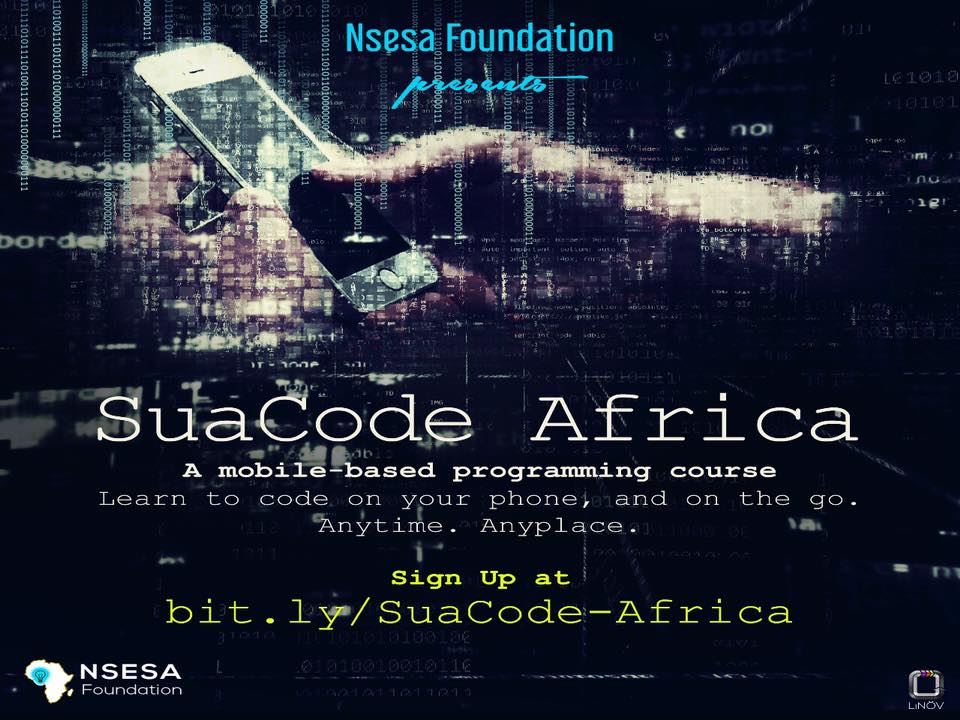
Title of Innovation: SuaCode
Year of implementation: 2018
Implemented by: Nsesa Foundation
Country/Countries where the Innovation is being implemented: Ghana
Problem being solved
According to the International Telecommunication Union (ITU), ICTs form the backbone of today's digital economy and have enormous potential to fast forward progress on the SDGs and improve people's lives. Africa lags behind the rest of the world in terms of digital literacy. According to SAP, less than 1% of African children leave school with basic coding skills. One cause of this gap is poor access to equipment such as computers for teaching and learning. According to research firm Ovum, there will be 929.9 million smartphones by the year 2021. Hence, smartphones provide a unique means of reaching the unreached.
Description of innovation
Our program, SuaCode aims to address Africa’s digital gap by introducing students in Africa to coding through smartphones. SuaCode is a smartphone-based online coding course that aims to teach millions across Africa how to code by exploiting the proliferation and untapped capabilities of smartphones. SuaCode is run by Nsesa Foundation, an education nonprofit in Ghana whose vision is to spur an “Innovation Revolution” across Africa by training the next generation of African innovators. Learners in SuaCode are introduced to basic coding using their smartphones in the Processing language, an open-source interactive programming language based on Java. The course is peer-reviewed and based on Dartmouth College’s Intro to Programming Course. SuaCode is currently hosted on Google Classroom, a free learning management system that can run offline and consists of lesson notes, exercises and assignments, which culminate in a final project - building a pong game. When a student signs up, she tries out the exercises using the app as she reads the lesson notes offline. After going through each lesson note, she completes the assignment for the lesson using the Android Processing Development Environment app and submits it for grading. At the end of the course, students that score the pass mark receive a certificate and exceptional students have mentoring sessions with our network of Software Engineers at top tech companies like Google and Facebook to help them proceed to the next step in their development. SuaCode also helps students continue their coding journey by recommending advanced courses like Data Structures, Algorithms, etc.
Outcomes and Impact
According to ITU, mobile learning has the ability to help break down economic, rural-urban and gender divides. We believe SuaCode will go a long way to bring coding skills within arms reach of people across Africa, literally into their palms. Soon, young people all over Africa will be spending as much time coding on their smartphones as they do on social media. The government and private sector are struggling to fill positions for people with coding skills. This skill set also presents excellent entrepreneurial opportunities. Hence, SuaCode is a unique solution to tackle the problem of unemployment for the 29.1 million youth across Africa.
Potential to be scaled and replicated
Our main target market is the 54.2 million high school and college students out of the 203.2 million students in Africa. We have won two successive fellowships from the Processing Foundation to support this work. In 2018, we ran a pilot of the course with 30 students. In 2019, we plan to run 3 cohorts with 100 students and also to build an AI-powered automated system to give feedback to students and grade their assignments to make our solution even more scalable. In 2020, we plan to run 12 cohorts per year with a target of one hundred students per cohort. We plan to scale to 1,000 learners per cohort in 2021 and 10,000 learners per cohort.
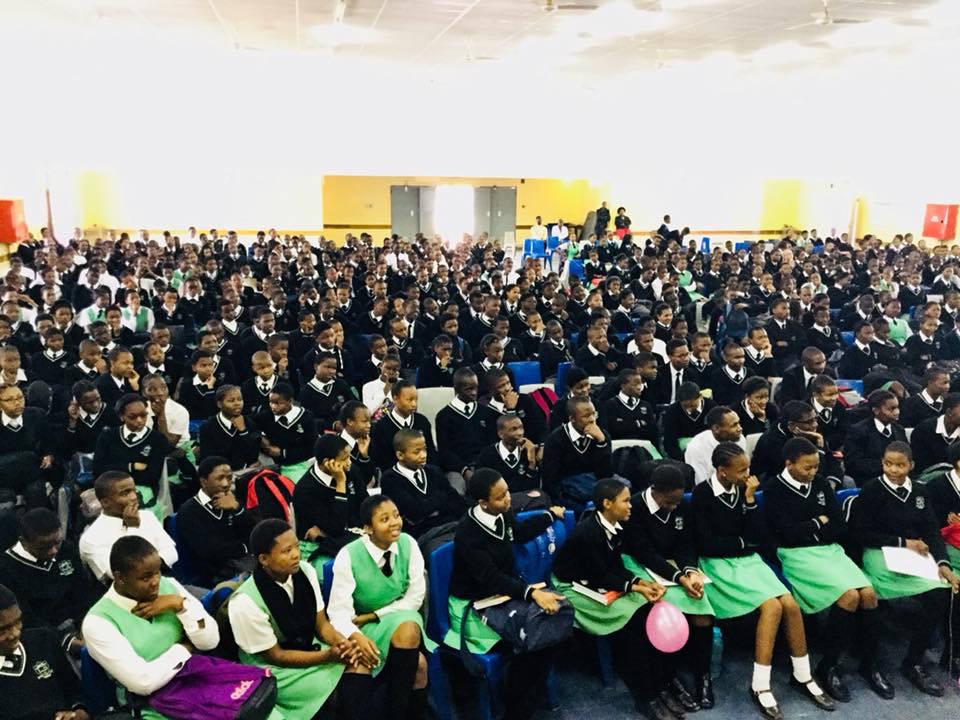
Title of Innovation: Classmate
Year of implementation: 2016
Website: www.classmate.co.bw
Implemented by: Classmate Online
Country/Countries where the Innovation is being implemented: Botswana
Problem being solved
Current teaching is still using conventional approach which has proven to have gaps as evidenced by the decline in performance of students compared between Government and Private Schools. The continuous increase in student numbers has also created capacity and resourcing challenges that further impede in effective delivery of education. Examples include high teacher/ student ratios.
Majority of youths are on existing social media platforms for social or recreational use which may hinder their concentration on their studies.
Botswana is currently trying to develop and produce employment ready labor force by heavily investing in educatio
Description of innovation
Classmate is a 100% citizen owned, home grown solution created with the chief aim to innovate the way students interact with the academic curriculum, other students and career motivated materials.
With this application we will keep students engaged in the multiple streams of interactions available to them that make it exciting, comfortable, challenging and inspiring. The system is self-sustaining and dependent on the inputs of the students when interacting with each other as well as tailored Online content such as Competitions, Quizzes, tutorials, career fairs, promotions, inter student experience sharing in a safe, controlled and data secured platform
One of the major benefits and key selling features of classmate is the ability and the function to interact and connect students from, A - Rural and under privileged schools and those from B - significantly positive setting include private institutions. The system encourages them to share experiences, achievements, successes, challenges and indeed academic knowledge.
Students A – Benefits from the exposure and benchmarking from Student B.
This will allow them to widen their horizon, appreciate what lies ahead and indeed outside of their circumstances
Students B – Benefits from the exposure and benchmarking from student A
This allows for students the opportunity to mentor and motivate the less privileged and contribute to their moral fibre
Outcomes and Impact
Socially and morally responsible social media
Classmate utilizes existing policies and infrastructure and thus has minimal financial input from stakeholders.
With this application we will keep students engaged in the multiple streams of interactions available to them that make it exciting, comfortable, challenging and inspiring. The system is self-sustaining and dependent on the inputs of the students when interacting with each other as well as tailored Online content such as Competitions, Quizzes, tutorials, career fairs, promotions, inter student experience sharing in a safe, controlled and data secured platform.
Potential to be scaled and replicated
Currently we running the project with partnership of Botswana Telecommunication Corporation to enable schools with connectivity to access the platform across the country so we believe that if AU can adopt the model across all AU countries the project can up scale.
Page 6 of 7


